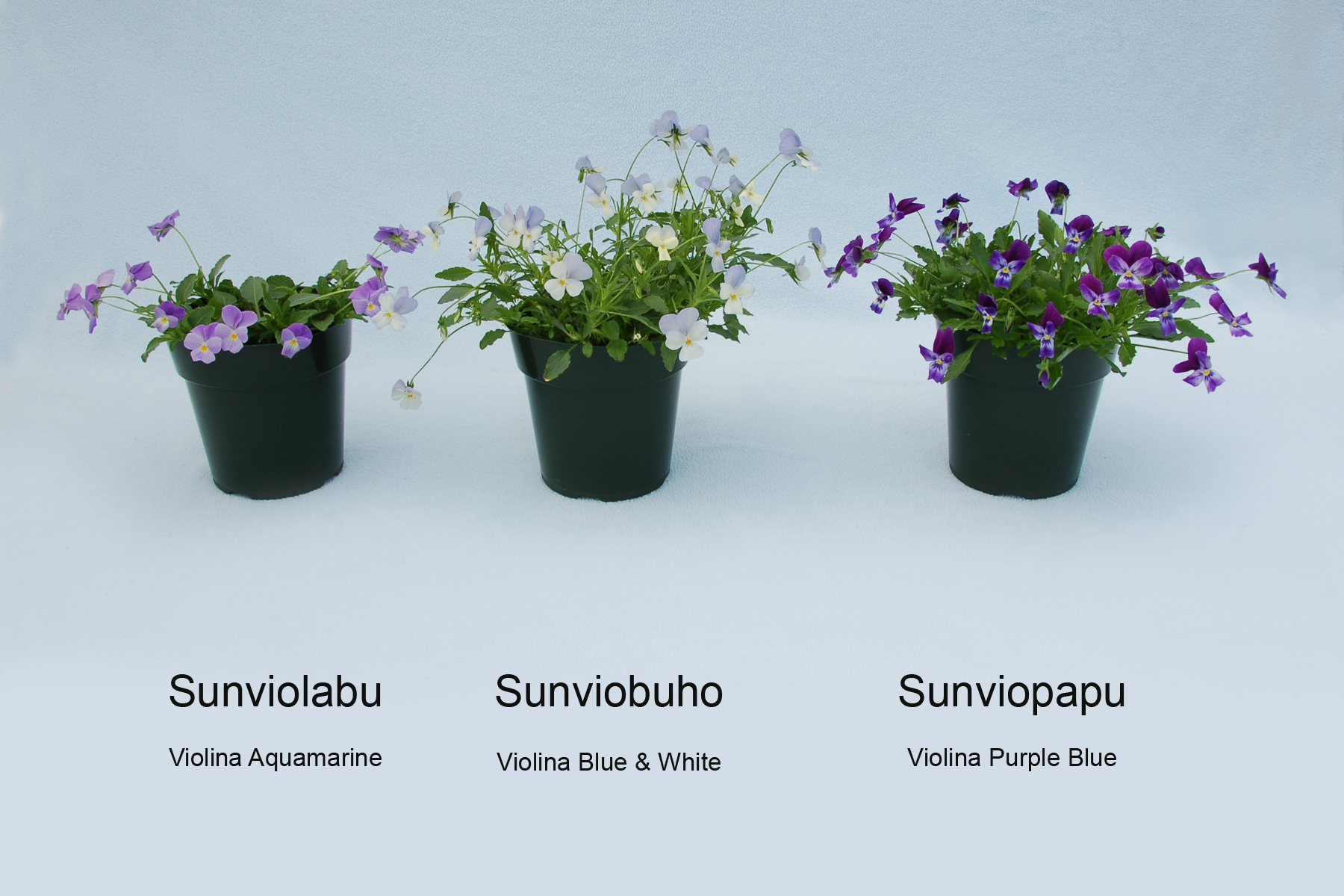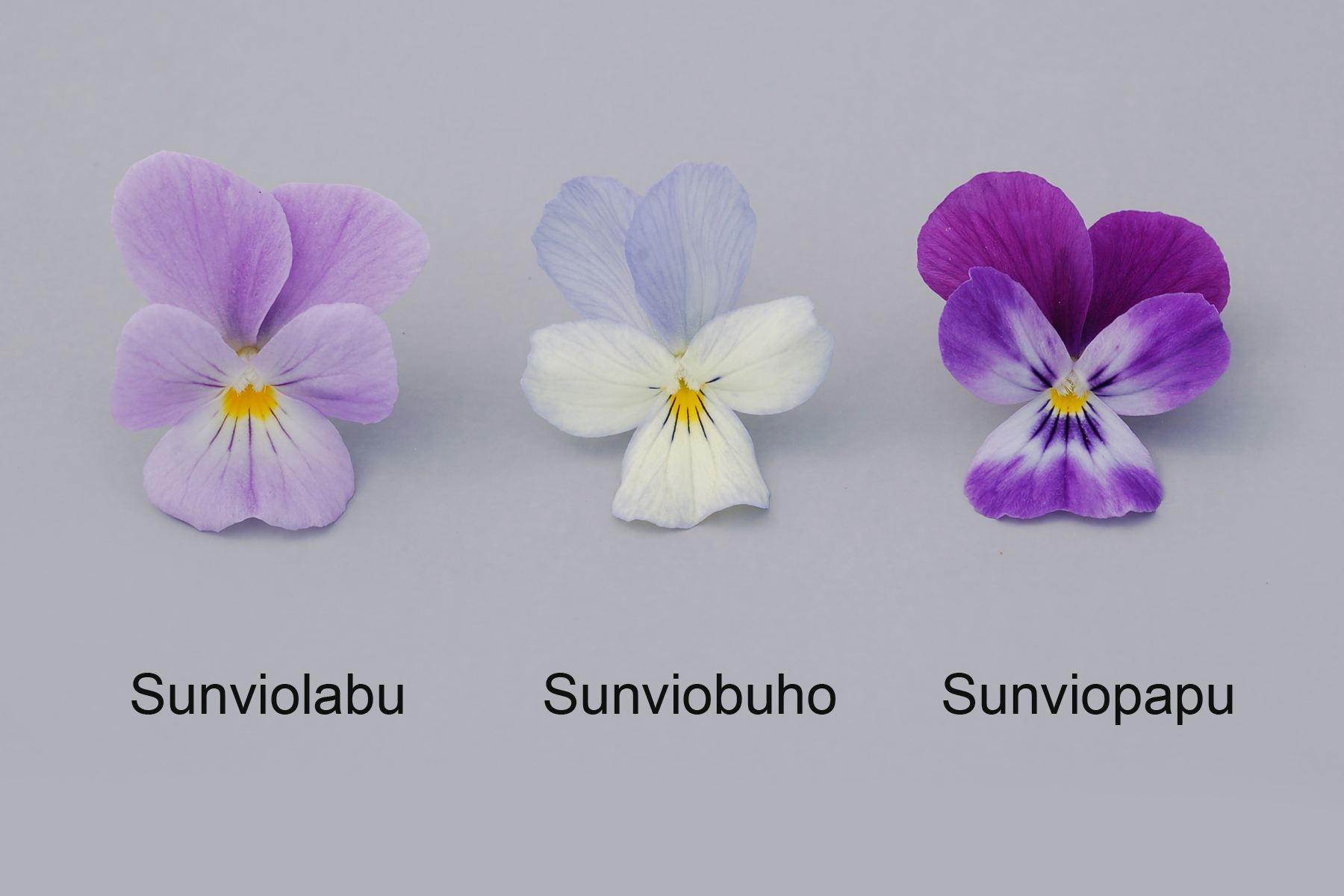Sunviolabu
| Denomination: | 'Sunviolabu' |
|---|---|
| Trade name: | Violina Aquamarine |
| Botanical Name: | Viola cornuta |
| Applicant/Holder: |
Suntory Flowers Limited Administrative Division 4-17-5 Shiba, Minato-ku Tokyo 108-0014 Japan |
| Breeder: |
Naoto Takamura, Suntory Flowers Limited, Shiga, Japan |
| Agent in Canada: |
BioFlora Inc. 38723 Fingal Line R.R. #1 St. Thomas, Ontario N5P 3S5 Canada Tel: 519-317-7511 |
| Application Date: | 2007-05-04 |
| Application Number: | 07-5910 |
| Grant of Rights Date: | 2009-05-25 |
| Certificate Number: | 3517 |
| Date rights surrendered: | 2015-05-11 |
Variety Description
Varieties used for comparison: 'Sunviobuho' (Violina Blue & White) and 'Sunviopapu' (Violina Purple Blue)
Summary: The plants of 'Sunviolabu' are broader than those of 'Sunviobuho' and narrower than those of 'Sunviopapu'. 'Sunviolabu' has an ovate shaped leaf blade while that of 'Sunviobuho' is elliptic to lanceolate and that of 'Sunviopapu' is elliptic. 'Sunviolabu' has a shorter petiole than both reference varieties and a broader lower petal than 'Sunviobuho'. The upper side of the upper petal of 'Sunviolabu' is violet while it is light violet blue for 'Sunviobuho' and dark violet for 'Sunviopapu'. The spot at the base on the upper side of the lower petal is yellow orange for 'Sunviolabu' while it is yellow for 'Sunviobuho' and yellow surrounded by blue violet for 'Sunviopapu'.
Description:
PLANT: semi-upright growth habit
PEDUNCLE: sparse to moderate pubescence
LEAF BLADE: ovate, obtuse apex, cuneate base, crenate margin, medium green on upper side, sparse pubescence, weak glossiness on upper side
SEPAL: lanceolate, acuminate apex, light green, sparse to medium pubescence on margins only
UPPER PETAL: violet on upper side
LATERAL PETAL: blue violet on upper side, weakly conspicuous stripe type markings on upper side
LOWER PETAL: upper side is violet with blue violet towards base, weakly conspicuous stripe type markings on upper side, yellow orange spot at base on upper side
Origin & Breeding History: 'Sunviolabu' originated from a cross between the female parent designated '02V-15-3' and the male parent designated '0V-40-1' which was conducted in April 2003 at the Omi R&D Center of Suntory Flowers Ltd. in Higashiomi-shi, Shiga-ken, Japan. In April 2004, one seedling was selected for its spreading growth habit, flower size and flower colour. This seedling was propagated by cuttings, planted in pots and subjected to trials beginning in October 2004. It was concluded that this variety is distinct, uniform and stable and as a result was named 'Sunviolabu'.
Tests & Trials: Trials for 'Sunviolabu' were conducted during the spring of 2008 at BioFlora Inc. in St. Thomas, Ontario. There were 15 plants of each variety. All plants were grown from rooted cuttings and transplanted into 11.5 cm pots on March 17, 2007. Observations and measurements were taken from 10 plants or parts of plants of each variety on May 1, 2008. All colour determinations were made using the 2001 Royal Horticultural Society (RHS) Colour Chart.
Comparison tables for 'Sunviolabu' with reference varieties 'Sunviobuho' and 'Sunviopapu'
Plant width (cm)
| 'Sunviolabu' | 'Sunviobuho' | 'Sunviopapu' | |
|---|---|---|---|
| mean | 22.3 | 15.3 | 27.5 |
| std. deviation | 2.32 | 1.60 | 2.12 |
Petiole length (cm)
| 'Sunviolabu' | 'Sunviobuho' | 'Sunviopapu' | |
|---|---|---|---|
| mean | 1.6 | 2.7 | 3.1 |
| std. deviation | 0.43 | 0.27 | 0.62 |
Lower petal width (cm)
| 'Sunviolabu' | 'Sunviobuho' | 'Sunviopapu' | |
|---|---|---|---|
| mean | 2.0 | 1.5 | 1.9 |
| std. deviation | 0.15 | 0.24 | 0.11 |
Petal colour (RHS)
| 'Sunviolabu' | 'Sunviobuho' | 'Sunviopapu' | |
|---|---|---|---|
| upper petal-upper side | N87B | 97A-B | 83A |
| lateral petal-upper side | N88C | lighter than 1D | 92B with more violet than N88A towards margin |
| lower petal-upper side | N87C margin with N88C-D towards base | lighter than 1D with 97B tones in margin area | 92B with N88A in margin area |
| lower petal-basal spot | 14A | 12A | 12A surrounded by N88A |
Click on image for larger view

Viola: 'Sunviolabu' (left) with reference varieties 'Sunviobuho' (centre) and 'Sunviopapu' (right)
Click on image for larger view

Viola: 'Sunviolabu' (left) with reference varieties 'Sunviobuho' (centre) and 'Sunviopapu' (right)
- Date modified: